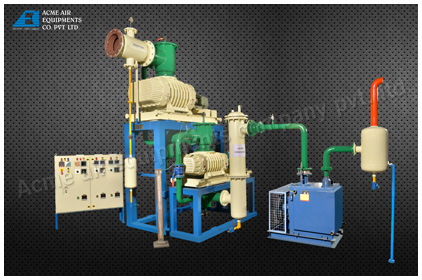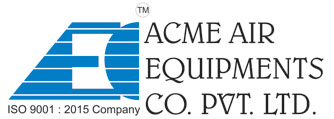Table of Contents
Across Europe, industries are becoming increasingly focused on improving the efficiency of their operations. This trend is having a significant impact on the market for vacuum systems, particularly mechanical vacuum boosters. As companies seek to meet environmental regulations, reduce operational costs and improve energy efficiency, mechanical vacuum boosters are playing a pivotal role in enhancing the performance of vacuum systems.
Mechanical boosters are integral in a range of sectors such as semiconductor manufacturing, pharmaceuticals, food packaging and chemicals. Their ability to provide high performance while minimizing energy consumption is making them an essential component of modern industrial applications. This guide will explore how the demand for high-efficiency vacuum solutions is influencing the European market for these boosters and how it is shaping the future of industrial operations in the region.
What is a Mechanical Vacuum Booster?
A mechanical vacuum booster is a specialized pump that improves the efficiency of vacuum systems. By increasing the flow rate and maintaining low pressure levels, these pumps complement primary vacuum pumps to optimize performance. They are especially valuable in applications requiring precise and low vacuum levels.
These boosters are designed to enhance the operation of vacuum systems by providing extra compression, allowing for more efficient handling of gases. This can be beneficial in a variety of industries where performance and energy efficiency are paramount.
Key Features of Mechanical Vacuum Boosters
- Enhanced Flow Capacity: These pumps are engineered to handle large volumes of gas, making them ideal for industries that require high flow rates.
- Improved Energy Efficiency: With growing environmental concerns, vacuum boosters are designed to minimize energy consumption while delivering high efficiency.
- Reliability and Durability: Mechanical vacuum boosters require less maintenance compared to other types of vacuum pumps, offering a cost-effective and long-lasting solution for industries.

How High-Efficiency Vacuum Systems are Driving Demand for Mechanical Vacuum Boosters
The Shift Toward Energy-Efficient Solutions
Energy efficiency is at the forefront of industrial innovation, particularly within the European market. Various government regulations across Europe, including the EcoDesign Directive, aim to reduce energy consumption in industrial equipment. As a result, industries are increasingly turning to vacuum systems that are not only effective but also energy-efficient.
Mechanical Boosters are crucial in meeting the high demands of modern vacuum systems, helping to reduce energy consumption and operational costs. The increased reliance on these systems can be seen in sectors like semiconductor manufacturing, where vacuum levels must be precisely controlled. The adoption of vacuum boosters helps companies achieve the desired performance while keeping energy costs low.
Technological Integration for Optimized Performance
The rise of automation and smart technologies in vacuum systems is another factor contributing to the demand for mechanical vacuum boosters. These systems can now be integrated with intelligent controls that monitor and adjust performance in real-time, optimizing energy use and extending the life of the equipment.
The ability to remotely monitor and adjust vacuum performance leads to better resource management and more efficient operations. This technological shift is particularly appealing to industries across Europe, where innovation and efficiency are closely linked.
Impact of High-Demand for Vacuum Systems in Key European Cities
Berlin, Germany: Growth in Semiconductor Manufacturing
Germany and specifically Berlin, is a hub for semiconductor manufacturing. As the demand for microchips continues to rise, companies in Berlin are increasingly relying on mechanical vacuum boosters to maintain the ultra-low pressures needed for semiconductor fabrication.
Mechanical boosters are essential in these settings, as they enhance the performance of primary vacuum pumps and ensure high flow rates and energy efficiency. With the expansion of Germany’s high-tech manufacturing sector, mechanical vacuum boosters are becoming indispensable tools for meeting the industry’s growing needs.
Milan, Italy: Demand from Automotive and Packaging Sectors
Milan is a key city in Europe’s automotive and packaging industries. These sectors rely on vacuum systems for processes like molding, sealing and material handling. As manufacturers in Milan look to improve both performance and energy efficiency, the adoption of vacuum boosters is becoming more widespread.
In the packaging industry, where consistency and quality control are essential, mechanical boosters help maintain reliable vacuum levels while minimizing energy consumption. The automotive industry also benefits from enhanced efficiency in production processes, which is critical as companies look to optimize operations and reduce costs.
Paris, France: Pharmaceutical and Chemical Industries
In Paris, the pharmaceutical and chemical industries are significant drivers of demand for vacuum systems. These sectors require precise vacuum conditions for processes such as drying, distillation and filtration. Mechanical Vacuum Boosters help maintain the necessary vacuum levels while offering energy savings and minimizing operational expenses.
As the pharmaceutical sector in Paris continues to grow, particularly in the production of vaccines and other essential drugs, the need for reliable and energy-efficient vacuum systems is expected to increase. Vacuum boosters provide the necessary support for these industries, ensuring consistent performance without the high energy costs associated with traditional vacuum systems.
Barcelona, Spain: Growth in Renewable Energy and Manufacturing
Barcelona has seen significant growth in the renewable energy sector, which is contributing to an increased demand for efficient vacuum systems. Vacuum technology plays an important role in manufacturing components for solar panels, wind turbines and other renewable energy technologies.
Mechanical vacuum boosters are integral to these production processes, as they help maintain the precise conditions required for high-quality manufacturing. Additionally, as Barcelona continues to push for more energy-efficient solutions, mechanical boosters align well with the city’s goals of reducing energy consumption and supporting industrial practices.
London, UK: Technological Advancements and Research
London remains one of Europe’s leading centers for technological advancements and research and development. The demand for vacuum systems is high across industries such as electronics, research and pharmaceuticals. These industries require efficient and high-performance vacuum systems to meet their unique needs.
In particular, the electronics sector in London relies on vacuum technology to support manufacturing processes that demand extremely low pressures. As innovation in the city continues to thrive, mechanical vacuum boosters will be in greater demand, offering enhanced efficiency and operational performance.
FAQs
1. What industries benefit most from mechanical vacuum boosters?
Mechanical vacuum boosters are crucial for industries such as semiconductor manufacturing, pharmaceuticals, food packaging and automotive. These sectors rely on high-efficiency vacuum systems to optimize production and meet strict quality standards.
2. How do vacuum boosters contribute to energy efficiency?
Vacuum boosters help maintain consistent vacuum levels while reducing the energy required to achieve low-pressure conditions. This leads to reduced overall energy consumption, making them an essential component of energy-efficient systems.
3. Why are mechanical vacuum boosters important in semiconductor manufacturing?
In semiconductor manufacturing, precise vacuum conditions are necessary for producing high-quality chips. Mechanical vacuum boosters provide the necessary support by ensuring optimal vacuum performance, which is critical for the quality and yield of the final product.
4. How are mechanical boosters integrated into existing vacuum systems?
Mechanical vacuum boosters are often added to existing vacuum systems as secondary pumps, enhancing the performance of primary pumps. They work in tandem with other pumps to provide higher flow rates and more efficient operation.
5. Do mechanical vacuum boosters require frequent maintenance?
Mechanical vacuum boosters typically require minimal maintenance due to their simple design and fewer moving parts. Regular inspections and maintenance checks are sufficient to ensure their continued efficient operation.
Conclusion: The Future of Vacuum Systems in Europe
The growing demand for energy-efficient vacuum solutions is having a significant impact on the European market for mechanical vacuum boosters. With industries across Europe embracing high-efficiency systems to reduce operational costs and meet regulatory standards, these boosters are playing a key role in enhancing vacuum system performance.
Cities such as Berlin, Milan, Paris, Barcelona and London are at the forefront of this shift, as they continue to innovate and expand their industrial capabilities. As the focus on energy efficiency and performance continues to drive the market, the future for mechanical vacuum boosters in Europe looks promising, with ongoing technological advancements likely to further fuel their adoption across diverse industries.
About Author

CEO
Mr. Vishwesh Pardeshi is the CEO of Acme Air Equipments Company Pvt. Ltd., an industrial and engineering goods manufacturing company based in Ahmedabad, Gujarat (India). He has taken over the responsibility from founding Partners and Directors of the Company, and is now leading a talented group of professionals since 2020 by bringing in vast industrial and management expertise. By qualification, he holds a Bachelor Degree in Mechanical Engineering and also holds a MBA degree from reputed institutes. Under his leadership, the Company has successfully executed prestigious projects by delivering high quality and world class products from a state of the art manufacturing facility which combines CNC-enabled precision manufacturing and strong after sales support. In line with the Vision, Mission and Core Values of the Organization, Mr. Vishwesh Pardeshi continues to drive Quality, Reliability and Global Expansion at Acme Air Equipments Co. Pvt. Ltd.









